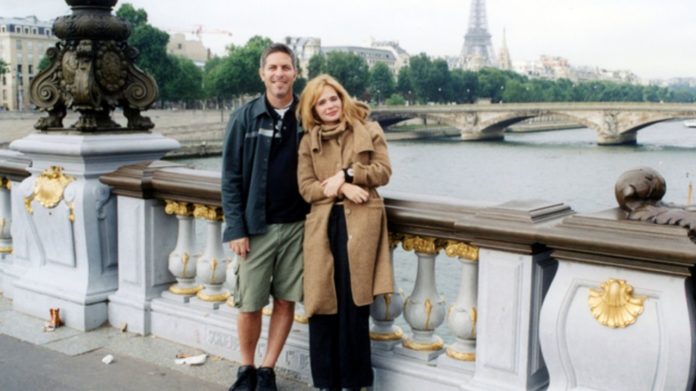
DOCUMENTARY “Adrienne”
WHEN|WHERE Wednesday at 8 p.m. on HBO
Adrienne Shelly was a celebrated actor who starred in a pair of major independent films — Hal Hartley’s “The Unbelievable Truth” (1989) and “Trust” (1990) — then went on to launch side careers as a successful screenwriter and director. Her hit movie, “Waitress” (2007) was later turned into the hit Broadway musical of the same name.
Those are the basic facts. Here are some more: Born Adrienne Levine, and raised in Jericho, she married Andy Ostroy, a marketing executive, with whom she had a daughter, Sophie. On Nov. 1, 2006, Ostroy dropped Shelly off at her studio office in Greenwich Village. He arrived hours later to find her dead, an apparent suicide.
This life and that death are explored in “Adrienne” which was produced and directed by Ostroy, who appears on camera. In this wrenching, deeply moving film, Ostroy has interviewed family and friends to celebrate Shelly’s life but he has also reinvestigated her death. She was murdered by Diego Pilco, an undocumented immigrant and construction worker, who staged the crime to make it appear a suicide. In a climactic scene in “Adrienne,” Ostroy interviews Pilco at the upstate prison where he is serving a 25-year sentence.
I spoke with Ostroy recently. An edited version of our conversation:
When and why did you decide to make this film?
I had been working on a book for a few years about the same story — Adrienne’s life, death and aftermath — and one night I took Adrienne’s mom, Elaine [Langbaum], to see ‘Waitress” and there were a few women from out of town sitting behind us, and before the curtain went up, they got to talking with Elaine and eventually she shared that Adrienne had something to do with this musical, and one of the women responded, ‘oh, that’s great, is she here tonight?’ At that moment, I looked around at the audience [and] wondered, how many of them know who Adrienne is, or what happened to her? That was the trigger moment when I thought the best way to honor and pay tribute to her was through a film.
Fifteen years later, has Adrienne been forgotten?
Well, in a way, the answer is yes, and that was a big part of the motivation to make this film. As the years slipped away, one of her legacies was that of a murder victim, and that wasn’t the last impression of her that I wanted the world to have.
Long Island seems to have been particularly important in Adrienne’s life, especially with the Hartley films [Hartley is a Lindenhurst native, with both of his Shelly films set on Long Island.] Was it? She knew that there was a world out there beyond Long Island and that’s no slight on the Island — but she was just always creatively minded and knew early on, this ain’t gonna happen on Long Island. After her third year at Boston University, she was able to move to New York and she said ‘that’s where I want to go.’ [But] I think I got her in my life at a time when she had matured and was an adult comfortable in her own skin, and I fell in love with Adrienne Levine, this Jewish girl from Long Island. That’s who I fell in love with. I saw Long Island. I didn’t see Hollywood.
Let’s talk about the case. The press at the time indicated that had it not been for you, her death – initially ruled a suicide — would not have lead to the murder charge. The film reconfirms all this.
To this day, I’ll never know exactly what happened [except] I did try to shift the narrative from suicide. There was no way I could accept that my wife, whom I lived with and I knew how happy she was, would take her own life. [Nevertheless,], in the end, it was good old-fashioned police work [but] that is also partly why I made this film, and hope that if just one person watches and something may happen to somebody in their family, they can go, ‘hey wait, that guy [Ostroy] went on the [TV] news and just talked up a storm…’
Why did you feel compelled to do the jailhouse interview with Pilco?
The goal was twofold — to find out what really happened that day because he had lied at his confession, and lied at the sentencing. I just felt unsettled. I needed to find the truth. [And] second, I wanted him to see a mother, a wife, I wanted him to see a daughter. I wanted him to see a human being and want in some way for that to haunt him the rest of his life.
You speak of your love for Adrienne having been “frozen in time,” and of an ongoing process of trying to come to terms with what happened — a process that includes the making of this film. Will there ever be a point when you can move on?
For me there is no closure. I don’t understand closures …. I think people are trained to sort of need a system where there’s an end. But when somebody really close to you dies and maybe dies in a horrific way, how do you ever forget that? How do you ever, especially when there’s a child involved? That doesn’t mean you can’t be happy and move on with your life. I’ve done that for 15 years.








